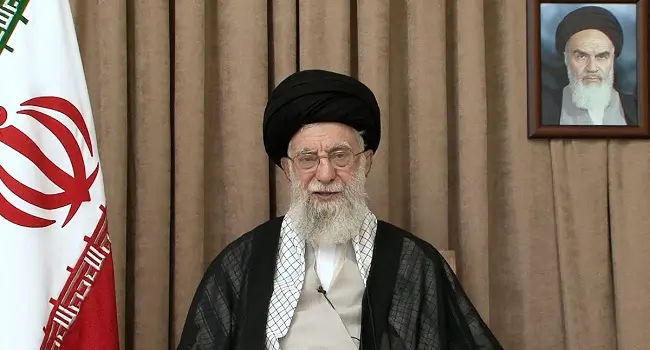In a defiant televised broadcast, Iran’s Supreme Leader Ayatollah Ali Khamenei declared what he called a “victory” over Israel following a tense 12-day conflict, while issuing a stern warning to the United States: “If the U.S. attacks again, Iran will strike back—hard.”
The 86-year-old leader broke his public silence for the first time since the outbreak of hostilities on June 13, appearing in a pre-recorded message aired nationwide by Iranian state television. Khamenei’s statement marked a pivotal moment in the region’s rapidly evolving geopolitical landscape and was delivered with unmistakable confidence, despite international skepticism and the heavy toll of war.
“We have delivered a slap to America’s face,” Khamenei declared, referencing Iran’s missile strike on the U.S. Al Udeid Air Base in Qatar earlier this week—a move he said symbolized Iran’s readiness and reach. “If they strike again, we will target all U.S. bases in the region. This is not a threat. It’s a promise.”
Khamenei Celebrates What He Calls a “Total Victory” Over Israel
Throughout the broadcast, Khamenei framed the outcome of the recent Iran–Israel confrontation as a “total victory” for the Islamic Republic. He argued that the United States’ direct military involvement was a desperate effort to prevent Israel from collapse.
“America entered this war to save Israel from complete destruction,” he said. “And even then, the Islamic Republic emerged victorious.”
This interpretation, clearly tailored for domestic audiences, coincided with pro-government rallies across major Iranian cities, where citizens waved flags, chanted slogans, and carried portraits of national leaders and martyrs. Demonstrators in Tehran were seen shouting, “Death to America” and “Death to Israel,” reinforcing the regime’s messaging of triumph and resistance.
Downplaying U.S.-Israeli Nuclear Strikes
Khamenei also attempted to dismiss the impact of the June 21 U.S.-led aerial assault on Iranian nuclear sites. While the White House called it a critical success that disrupted Iran’s nuclear weapons infrastructure, Khamenei called it exaggerated.
“Their attack achieved nothing significant,” he said. “Trump inflated the results to mask his failure.”
However, satellite imagery obtained by Western intelligence suggests otherwise. Footage revealed movement of trucks from the Fordow enrichment site ahead of the strike, raising suspicions that Iran may have preemptively evacuated enriched uranium stockpiles—potentially preserving the core of its nuclear program.
Iran Suspends Nuclear Oversight Amid Rising Tensions
In a parallel development, Iran’s parliament, with the support of the Guardian Council, has voted to suspend cooperation with the International Atomic Energy Agency (IAEA). The move is seen as a direct response to U.S.-Israeli actions and signals a broader strategic pivot.
Officials say cooperation with the IAEA will only resume if Iran receives firm guarantees for the safety of its nuclear facilities—a demand that is unlikely to be met without extended international negotiations.
This suspension marks a significant blow to global non-proliferation efforts, leaving Iran’s nuclear intentions increasingly opaque.
Diplomacy Uncertain Amid Talk of Oman Meetings
Khamenei briefly alluded to upcoming diplomatic engagements in Oman but stopped short of confirming Iran’s participation. U.S. intelligence agencies have indicated that back-channel talks may involve partial sanctions relief in exchange for renewed transparency in Iran’s nuclear program.
Observers note that Iran’s hardline rhetoric is being carefully balanced with subtle diplomatic signals, suggesting that while Tehran may escalate militarily, it is also leaving the door open to negotiation.
Contrasting Narratives: Netanyahu Also Claims “Historic Victory”
In stark contrast, Israeli Prime Minister Benjamin Netanyahu has also declared a “historic victory” in a televised address on June 24. He claimed that the 12-day campaign had successfully neutralized existential threats from Iran’s nuclear and ballistic missile programs.
“We have removed the greatest threat to our national security,” Netanyahu said. “Iran’s ambitions have been decisively checked.”
International analysts have pointed out that both countries’ declarations of victory reflect deeper political messaging aimed at rallying domestic support and shaping global perception, rather than objective military outcomes.
Key Takeaways from Khamenei’s Broadcast
- Defiant Messaging: “Slap to America’s Face”
Iran’s missile strike on the U.S. base in Qatar was framed as a symbolic assertion of strength. Khamenei claimed Iran can hit American targets “whenever it deems necessary.”
- Warning of Retaliation
The Supreme Leader vowed full retaliation for any future U.S. attack, describing Iran’s capacity to strike back as credible and repeatable.
- “Total Victory” Over Israel
According to Khamenei, the war proved Israel’s vulnerability and highlighted U.S. dependence on military intervention to shield its ally.
- Minimizing Nuclear Strike Damage
He characterized the U.S. and Israeli airstrikes on Iran’s nuclear infrastructure as militarily insignificant, though international evidence remains inconclusive.
- Nuclear Oversight Suspended
Iran will no longer engage with the IAEA unless given security guarantees, raising the risk of further nuclear escalation.
- Ambiguous Diplomacy
Khamenei hinted at possible diplomatic engagements, but offered no commitment—leaving the international community watching closely.
Ayatollah Khamenei’s broadcast underscores a dangerous crossroads for the Middle East. With both Iran and Israel claiming victory and the United States warning of “consequences for renewed aggression,” regional stability hangs in the balance.
Whether the recent ceasefire marks a pause in escalating hostilities—or a calm before the next storm—will depend on the actions taken in the coming days. For now, Tehran is signaling that it’s neither backing down nor giving in.
New Daily Prime will continue to provide updates as this developing story unfolds.



